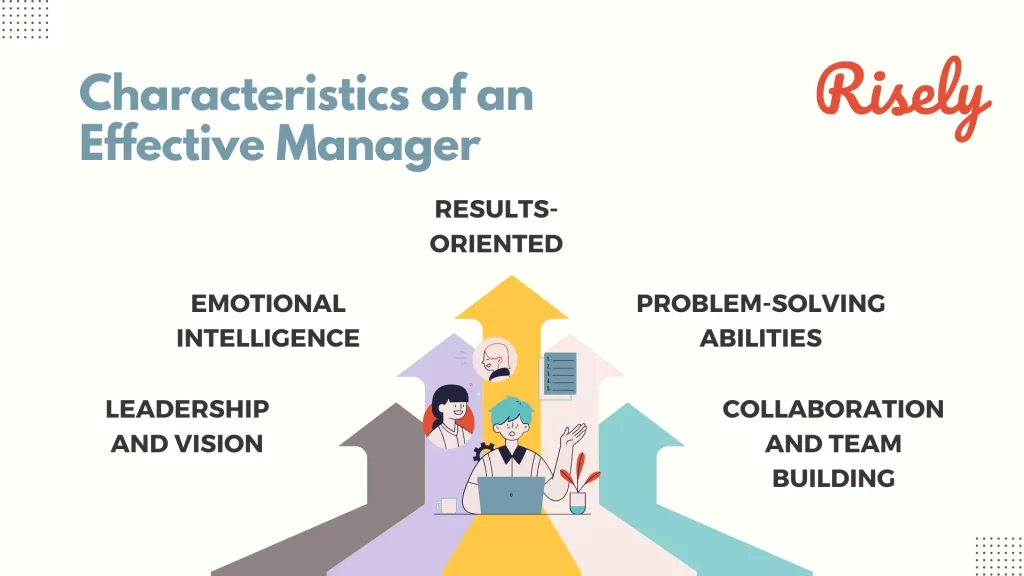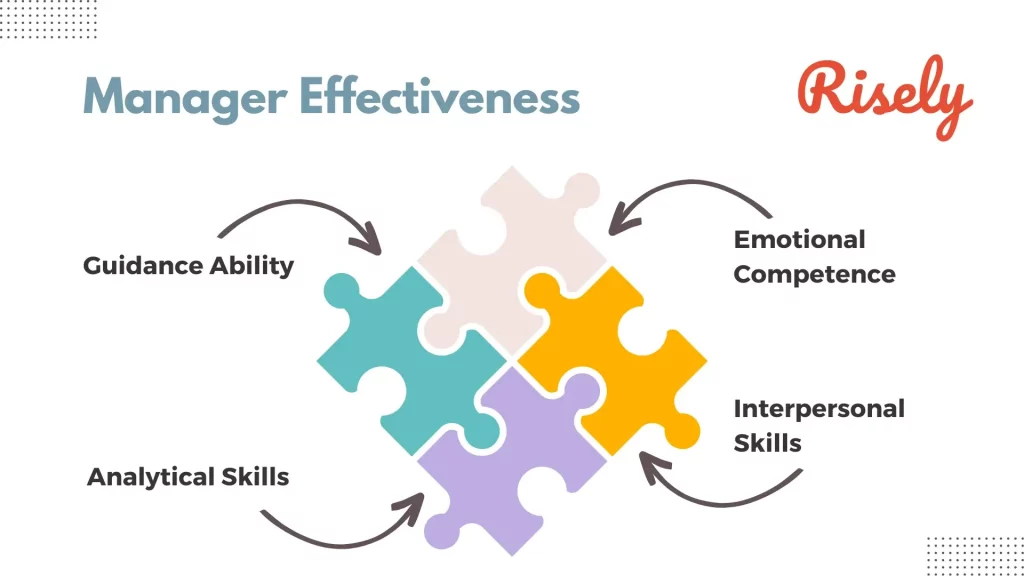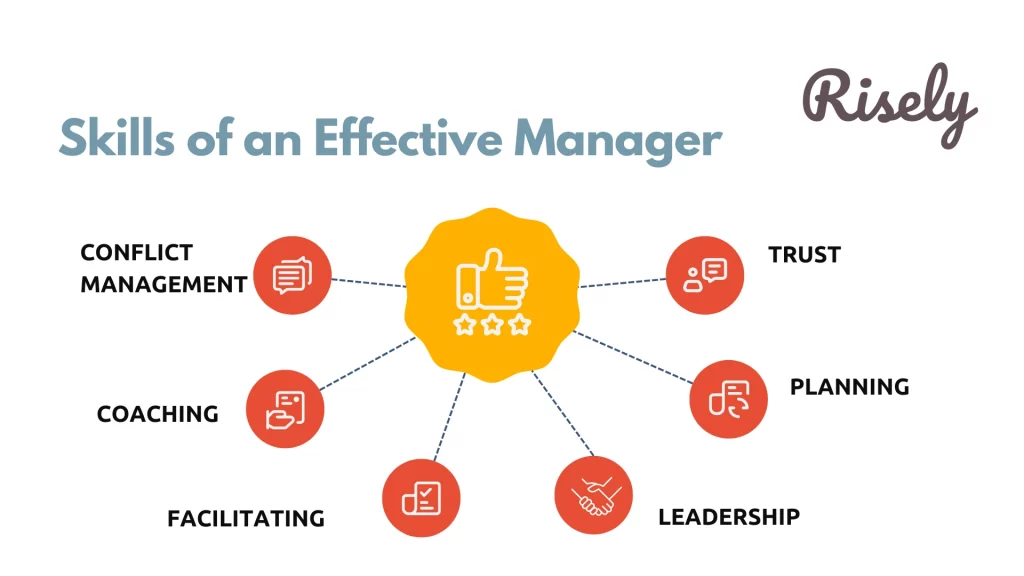Manager Effectiveness: A Complete Guide for Managers in 2024
Manager effectiveness is everyone’s favorite buzzword. But the road to achieving it is trickier than it looks like! While manager effectiveness can have many interpretations for different industries, in this blog, we will break down the secrets to managing teams effectively for all managers ready to attain their true potential. This comprehensive guide will teach you everything you need to know about how to effectively manage your team. You’ll learn how to create successful teams, manage team conflict and build strong relationships with your employees. This guide is perfect for managers at all levels of experience. From newly-appointed starters through to those who have been in the role for many years, this guide will be helpful. But, let’s first answer the ultimate question i.e. “what is an effective manager”?What is an Effective Manager?
An effective manager consistently achieves team goals, understanding the importance of employee retention and turnover. They possess strong leadership qualities and exhibit empathy towards team members. A great manager sets a good example for their team, skilled in time management. They also understand the importance of emotional intelligence in managing their team. These key definitions encompass the qualities that make a manager effective in driving their team towards success and creating a positive work environment. Team management refers to a manager’s ability to carry out and coordinate a team’s tasks and common goals. It is effective to support, communicate with, and uplift team members so they can perform to the best of their abilities and continue to grow as professionals. The main purpose of team management is not just to make sure that a few goals and tasks get completed. It is also to keep the employees motivated. Good team managers always have that ability.What are the characteristics of an Effective Manager?
- Leadership and Vision: They have a clear vision for the team and organization, guiding their team members towards common goals and inspiring them to excel.
- Collaboration and Team Building: They foster a sense of unity among team members, promote collaboration, and build strong relationships that contribute to team cohesion.
- Results-Oriented: Effective managers focus on achieving tangible results while supporting their team’s growth and well-being.
- Empathy and Emotional Intelligence: Effective managers understand and empathize with their team’s emotions, fostering a supportive and respectful work environment.
- Problem-Solving Abilities: Effective managers are resourceful in addressing challenges and finding solutions, involving their team in brainstorming and collaborative problem-solving.

Why should you care about Manager Effectiveness?
The importance of manager effectiveness comes as no surprise to anyone whose job it is to manage a team.- Boosts Employee Engagement: Manager effectiveness is crucial for engaging employees and fostering their commitment to the organization.
- Enhances Productivity: Effective management improves productivity, contributing to the team’s overall performance and outcomes.
- Drives Organizational Growth: As a key component of an organization’s growth, effective team management sets the foundation for success.
- Unleashes Potential: Team management empowers individuals to tap into their inner potential, develop expertise, and address challenges effectively.
- Facilitates Coordination: Effective management leads to better coordination among team members, promoting smoother collaboration and goal attainment.
The Key Components of Manager Effectiveness
Given how essential manager effectiveness is for teams, it should come as no surprise that there are specific skills necessary to get this right. We will divide this section into two parts. The first one will give 4 special and highly necessary skills which have proven their efficiency for years now. Further, we will add some more skills which are emerging as highly in-demand ones and assumed to be the keys to manager effectiveness.The 4 Special Skills of Effective Managers

1) Guidance Ability
It refers to a manager’s ability to guide the team members across various work situations, and it is one of the key tenets of manager effectiveness. Being a manager is not only about understandably communicating organizational vision and setting objectives that one can relate to. But it is also following through to achieve results. Managers with a strong guidance ability tend to emphasize the importance of efficiency and productivity to prioritize the highest-value work. The best way to guide the team as a team leader or manager is that you should first put your efforts into becoming the model figure (become a person whom everyone looks up to). You should further facilitate collaboration and should appreciate teamwork. You should encourage open feedback and transparency from and to the employees. At last, you must have the highly important quality of nurturance. It will allow you to show the members of your team at the work that you care about.2) Emotional Competence
Emotional competence, the second essential ingredient of manager manager effectiveness, refers to the Manager’s ability to keep emotions in check, be it their own emotions or others’. A manager must be able to express their emotions nicely for the smooth working of a team. Being an effective manager needs a head and heart behind it. There is no better way of management than staying emotionally competent towards your employees. This includes both giving appreciations when you feel happy and constructively expressing negative sentiments such as anger or stress when something goes wrong. Being self-aware enough that you can read between the lines of good or even bad criticism. Supportive managers understand and sense how other people feel. By showing authenticity as a manager and a sincere interest in those around them, they build trust and inspire colleagues to overcome challenges. They intervene in group work to promote organizational efficiency and prevent the energy of employees from dissipating into internal conflict. At work, emotional intelligence is critical so that you can see, reason, understand, and manage your emotions toward yourself and others. You can guide and assist people when dealing with emotions, and it can help you be happier and more successful. One of the core building blocks of emotional intelligence is compassion. Managers who demonstrate high levels of compassion are naturally able to understand and balance emotions. Luckily, compassion is a skill that managers can develop by understanding the right building blocks. The few most efficient ways of developing emotional competence at a personal level are by emotional management, handling team tensions, developing empathy, and managing conflict if any. Managers should never let the morale of their employees go down due to excessive workload or any other issues. The hard work of employees should always be appreciated.3) Analytical Skills
Analytical skills, the third component of manager effectiveness, refer to a manager’s ability to take disparate sets of information and draw insights. Managers should be well aware of what data is most relevant to their industry, how to gather it, and what the resulting numbers mean. The process that precedes decision-making is problem-solving, where information is gathered, analyzed, and considered. This is deceptively difficult to get right, yet it is a key input into decision-making for major issues as well as daily ones. Throughout your career in management, analytical skills will help you solve problems. Therefore having Analytical skills is highly important for managers. To develop Analytical skills, managers should develop the skills of information processing and resource allocation. Information Processing refers to the ability of a person or group (e.g., a manager, analyst) to reliably recognize relevant incoming information and deal with it primarily by formulating judgments to support decisions on what actions should be taken that have major consequences for organizations’ operation. Resource allocation is a plan that you develop to make the most of the resources at your disposal in a project. Analytical skills are critical because they allow you to find common problems and make informed decisions about which action to take next. For managers, this becomes critical because the team loops up to them to provide solutions in difficult situations. In such times, managers should be able to connect the dots that their team is unable to. Combined with the subject matter expertise, managers have a higher probability of providing solutions that will work in the real world.4) Interpersonal Skills
Interpersonal skills refer to a manager’s ability to be able to communicate with different sets of people to convey a message effectively. Interpersonal skills also mean the ability to work with other people or groups. Moreover, it includes managing relationships, covering social skills of listening and understanding others. A simple email can be a good reflection of these skills. Having the right set of interpersonal skills ensure that the managers have the capability to deal with diverse groups at all levels ensuring overall success. In addition, being well aware of management culture already enables you to strategize effectively whenever involved in change and development projects, or even in team-building, or finding the right people for jobs. The Interpersonal skills developed for a manager should cover areas like effective communication, collaboration skill, entertaining multiple perspectives, providing motivation, and balancing stakeholders. Managers with strong interpersonal skills have a strong rapport and they encourage approachability, likability, and comfort in their staff, as well as making team members feel as if they can go to their managers with any issues or concerns. The morale and productivity of your entire team or department can be influenced by the benefits of good interpersonal skills.What are the Skills of an Effective Manager?

Planning
Effective team management requires the ability to assess a situation and develop a plan of action based on what you find. It also demands the ability to keep everyone on track, motivates individuals when they need it most, and handles conflict effectively. Planning helps us in achieving our goals, and it allows for more efficient use of time and other resources. Planning is a method of action that entails analyzing and studying the objectives, as well as how we will achieve them. The planning process promotes team building and a spirit of cooperation, and it provides the information top management needs to make effective decisions. Learn more here: Strategic Thinking vs Strategic Planning: Which One Leads the Way to Success?Coaching
Effective team management skills include the ability to coach. This means helping others develop their knowledge about how to do things, increase performance, and improve efficiency as needed. It increases employee and staff engagement, as well as helps identify and develop high potential employees. Coaching helps both organizational and individual strengths and also helps in development opportunities. Workplace coaching aids in the formation of stronger bonds within teams in an organization. A coaching leadership style allows employees to become more comfortable with their leaders, and they can then seek assistance in a crisis.Facilitating
Effective team management skills also entail excellent facilitation or mediating of collaborative work processes that can help resolve the conflict between individuals. It ensures productivity through effective collaboration and the achievement of goals together. As group work is a central feature of modern life, facilitation has become widely accepted as the most effective method to achieve this collaborative process in an organization. Facilitation is important because meetings of large groups of people can be difficult to organize and control when they are in progress. It can help members of a group get to know each other and learn to cooperate. A manager will find it hard to manage a team without effective facilitation skills. The facilitation abilities are excellent at managing the team dynamics.Conflict Management
Clarity and rationality when trying to resolve conflict are very important in how people respond in matters of discussion or disagreement. Organizational conflicts are usually a result of reflection on some different perspectives that come together to create an argument because they want their ideas understood by others. Conflict is inevitable at a workplace and the right skills are required by every manager to manage it effectively. Honing conflict management techniques will help you better resolve conflicts in the future. Managing conflict can be a terrific opportunity to fix the problems within your team. It can also boost their morale. On the other hand, handling conflicts poorly can cause your employees to lose faith and respect for you as a manager. Therefore, it is essential for all managers to understand and develop conflict management skills.Leadership
Effective management means being an effective leader and a good delegator. It involves setting high standards but also holding people accountable to those same ideals. Leading by example, i.e. the ability to direct without dominating, must be mastered by managers. It helps in achieving success in managing teams successfully. To effectively lead a team, one must learn and practice sound techniques to influence people. The first step is to listen when others have something important to say. Also, you must address as many questions as possible as it will help you evaluate and suggest better for the team. Effective team leaders ensure that team morale remains high. They ensure that workers are motivated to perform well and to keep up the good work. They can also impact morale by assisting workers in taking a positive approach to their jobs and the company as a whole.Trust
Having cohesive teams relies on building trust within your group which depends upon integration amongst different interpersonal relationships and aspirations. Trustworthiness can be exemplified by honesty and integrity in the workplace, including freedom from conflict of interests having people openly share information that they don’t want to be shared such as specs or ideas not intended for any person outside the company. Teams can’t reach the highest levels of productivity and effectiveness without high levels of trust – they just can’t. Each member also needs to be able to trust others to stop gossip and infighting before it gets out of control. Trust is also important to develop healthy peer relationships. When your team members are comfortable with you and each other, they feel comfortable to speak out, take appropriate risks, and expose vulnerabilities. All these skills may help the managers in effectively managing their teams. It will also help them emerge as a good manager. But, just knowing how to manage teams effectively will not be enough for managers to carry it out. They should also know how to create successful teams for their organization.Other Interesting Reads
How to be an Effective Manager and Leader?
Measuring Manager Effectiveness: Manager performance Metrics
Measuring manager effectiveness can be done through qualitative and quantitative methods. Here are a few ways to measure manager effectiveness:- Employee feedback: Collect employee feedback through surveys or interviews to gauge their satisfaction with their manager’s leadership, communication, and support.
- Performance metrics: Look at key performance indicators (KPIs) such as employee productivity, turnover rates, and team performance to assess the impact of a manager’s leadership on overall results.
- 360-degree evaluations: Gather feedback from peers, direct reports, and superiors to gain a comprehensive perspective on a manager’s effectiveness in various areas, such as communication, decision-making, and team collaboration.
- Goal attainment: Assess whether managers meet their objectives and drive their teams towards achieving organizational goals.
- Employee development: Evaluate how well managers support their team members’ growth and development through training opportunities, coaching, and mentoring.
Tools to be an Effective Manager
Mixing tools in your work processes can help you become more effective and relieve the stress of juggling everything yourself. Here are a few areas where managers can do this:- Communication tools: Effective communication is crucial for successful management. Utilize email, instant messaging, and project management software to keep your team informed and connected.
- Time management tools: Managing your time effectively maximizes productivity. Consider using tools like task management apps, calendars, and time-tracking software to help prioritize tasks and stay organized.
- Performance tracking tools: Keep track of your team’s progress and performance using tools like performance management software or employee monitoring systems. These can help identify areas of improvement and provide valuable feedback.
- Collaboration tools: Foster collaboration among team members by using collaboration software or project management platforms that allow for easy sharing of files, tasks, and communication.
- Feedback tools: Provide regular feedback to your team members to help them grow and improve. Tools like feedback surveys and techniques like a feedback sandwich can facilitate and ensure the feedback process is consistent and constructive.
Effective Manager Training
Effective Manager Training is a program or course designed to provide managers with the knowledge, skills, and tools they need to be successful in their roles. This training typically focuses on developing critical managerial competencies such as leadership, communication, decision-making, problem-solving, and team management. Effective Manager Training aims to enhance a manager’s ability to drive performance, engage employees, and achieve organizational goals. The training may include workshops, seminars, coaching sessions, and other learning activities that allow managers to practice and apply new skills in real-world scenarios. However, these conventional methods of building manager effectiveness have limitations; hence, more useful tools for aiding manager effectiveness, like the AI co-pilot for leadership development, are leading the game. By investing in Effective Manager Training, organizations can cultivate a strong pool of capable and confident leaders who can effectively guide their teams and contribute to the organization’s overall success. Read more here: Leadership Development: The Complete Guide with 9 Impactful TipsManager Performance Goals Examples
- Team Development and Engagement:
- Goal: Increase team engagement scores by 15% through regular one-on-one meetings, skill development sessions, and recognition programs.
- Effective Communication:
- Goal: Improve communication by ensuring that team members receive clear instructions and updates, resulting in a 20% reduction in misunderstandings.
- Goal Alignment and Clarity:
- Goal: Enhance goal clarity within the team by conducting goal-setting workshops, leading to a 25% increase in team members’ understanding of their objectives.
- Performance Feedback and Coaching:
- Goal: Provide constructive feedback to each team member on a monthly basis, leading to a 10% increase in performance improvement plans and outcomes.
- Skill Development and Training:
- Goal: Ensure that each team member completes at least two professional development courses, contributing to a 15% increase in team skills and competencies.
How to Manage a Team Successfully?
Managers can create successful teams by understanding the different motivations that team members have. When managers can understand individual team members’ goals and aspirations, they can better motivate them and ensure that each member is working toward common objectives. Additionally, manager effectiveness includes setting clear expectations for both individual and group performance. It also includes providing incentive structures that encourage team effort. By following these principles, managers can create successful teams that are productive and enjoyable to work with. One of the major tasks in management is to create a good working environment where employees are happy and productive. Creating trust within your team will lead them to be more cooperative, productive, conscientious with their work. Then you can increase workload from your lower level and produce quality results as an example.Conclusion
Team management is one of the most important tasks for any manager. If you are a manager, you need to know how to manage your team effectively. You need to keep them motivated and at the same time motivate yourself as well. It is not only about having a great team but also making sure that your team works well together. In the above-written blog post, we have shared some tips on how to manage your team effectively. It will help and make them work like a well-oiled machine. I hope you found this information useful.Your success is precious. Don’t let ineffective habits hold you back.
Sign up today for Risely’s Manager Effectiveness Masterclass to access AI-enabled expert guidance on people management and leadership.
Other Related Blogs
Read this if you think you can run The Bear
Read this if you think you can run The Bear What if your favorite mom-and-pop deli is transformed into something high-end super quick? We are talking of The Bear, Carmy,…
New Managers and Small Teams: A Match Made Not Made In Heaven
New Managers and Small Teams: A Match Made Not Made In Heaven My team currently has nine people, including myself. That sounds pretty simple, right? After all, exactly how much…
Top 10 New Manager Skills That You Must Learn
Top 10 New Manager Skills That You Must Learn Congratulations on your promotion as a new manager! It’s a big transition and can be challenging. You may have been an…
5 Ways of Coaching for New Managers in the Age of AI
5 Ways of Coaching for New Managers in the Age of AI In today’s rapidly evolving business landscape, new managers face unique challenges. Not only do they have to adapt…


